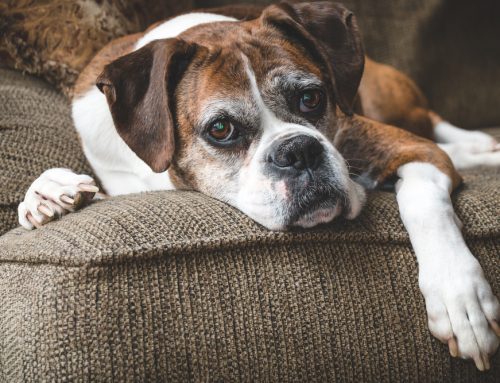This holiday season, everyone deserves to celebrate—including your pets. Before you start planning your festivities, take a moment to put yourself in the—er, paws—of your pet, and view the holiday happenings through their eyes. Curiosity about all the fun can spell danger for your pet. Keep them off the naughty list—and out of the emergency veterinary hospital—with our Palmer Vet Clinic team’s tips for happy, healthy, safe, and stress-free holidays with your pet.
Avoid cooking up trouble for your pet
Tasty food is part of what makes the holidays so great, but many treats can make your pet sick. These common holiday food ingredients can be toxic for pets:
- Chocolate — All chocolate—especially dark and baker’s chocolate—can be deadly to pets.
- Fatty foods — Fatty foods, like butter, oils, and grease, can cause pancreatitis.
- Onions and more — All parts of the onion plant are toxic. Garlic, shallots, leeks, and chives, of the same plant family, are also harmful.
- Grapes and raisins — Ingesting only one of these can cause kidney failure.
- Xylitol — This natural sweetener and sugar substitute used in many sugar-free baked goods is highly toxic to pets.
While your pet shouldn’t eat treats meant for humans, you can indulge their palettes by making healthy pet treats especially for them.
Don’t let your pet get wrapped up in decor
Your pet may not appreciate your Pinterest-worthy holiday decor, but they would be more than happy to play with all the new “toys” around the house—especially ones that are shiny, fuzzy, and make fun noises. To keep your pet safe, decorate mindfully, and don’t let your pet get wrapped up in trouble.
- Christmas tree — Secure your tree properly so your pet can’t knock it over, and limit your pets’ access to the tree if they chew on any branches. Ingested pine needles can puncture their intestinal tract and cause obstruction.
- Holiday plants — Many popular floral arrangements contain plants and flowers toxic to pets. Opt for pet-friendly flowers when decorating for the holidays, and keep plants up high and out of your pet’s reach. The following common holiday plants are toxic for pets:
- Holly
- Mistletoe
- Evergreens
- Lilies
- Azaleas
- Poinsettias—though not poisonous, ingested sap can cause gastric upset
- Candles — Always supervise your pet—especially excitable tail-waggers—around candles, and always blow out lit candles when leaving the house.
- Tinsel and ornaments —To your pet, these small, shiny adornments look like fun toys, but ingesting them can be dangerous. Tinsel and ornaments can not only cause stomach upset, but also can get tangled up inside your pet’s intestines, and require surgical intervention. Ingested glass can cause internal bleeding, so hang your most delicate ornaments high up on your tree.
Teach your pet—and guests—good party manners
Holiday parties are fun, but the added hustle and bustle—along with unfamiliar faces—can be stressful for your pet. Use the following tips when planning your holiday get-togethers, to ensure your pet’s safety and wellbeing:
- Provide a safe space — Before a party, ensure your pet has access to a safe space away from the excitement. Distract your pet with music or the television for background noise, and plenty of engaging toys.
- Consider medication — Contact your veterinarian if your pet is highly anxious, to discuss the benefits of anti-anxiety medication.
- Watch the exits — Keep an eye on your pet when people are entering or leaving your home. With an open door and distracted humans, they can easily slip out unnoticed. If your pet does get loose, a microchip and proper identification can help you get them home safely and quickly. Ensure your pet is microchipped, your current contact information is registered with the data company, and their collar is comfortably secure, with current identification tags.
- Curb counter surfing — Delicious, unattended food is a counter-surfing pet’s dream. Because so many holiday ingredients are unsafe for pets, food dishes should always be kept out of your pet’s reach.
Prepare for possible pet emergencies

Preparation can help you avoid potential pet hazards, but unforeseen accidents are still possible. Keep the 24-hour Pet Poison Helpline number handy, and call your veterinarian or the helpline immediately, if you suspect your pet has ingested a toxic substance. Signs your pet may have ingested a toxic item include:
- Vomiting
- Diarrhea
- Tremors
- Accelerated heart rate
Plan your holidays with time to spare, and share the gift of good health with your pet. Contact our Palmer Vet Clinic team to schedule your pet’s next wellness exam.








Leave A Comment